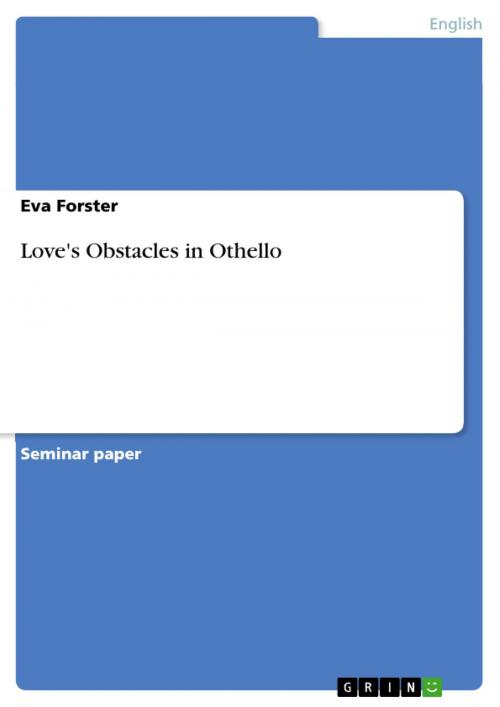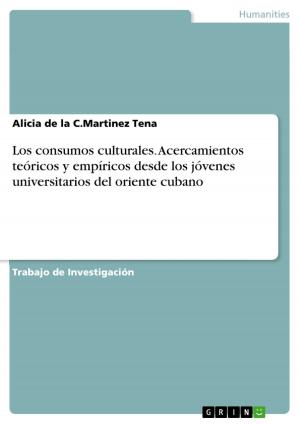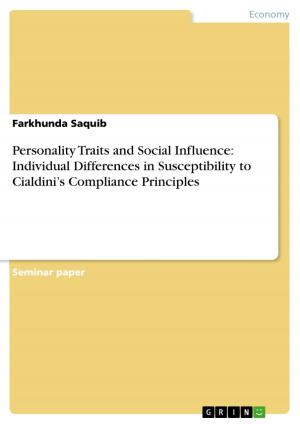| Author: | Eva Forster | ISBN: | 9783638476423 |
| Publisher: | GRIN Verlag | Publication: | March 7, 2006 |
| Imprint: | GRIN Verlag | Language: | English |
| Author: | Eva Forster |
| ISBN: | 9783638476423 |
| Publisher: | GRIN Verlag |
| Publication: | March 7, 2006 |
| Imprint: | GRIN Verlag |
| Language: | English |
Seminar paper from the year 2004 in the subject English Language and Literature Studies - Literature, grade: 1,0, University of Stuttgart (Institut für Literaturwissenschaft, Abteilung Neuere Englische Literatur), course: Shakespeare's Venice, 10 entries in the bibliography, language: English, abstract: Shakespeare's Othello is full of interpersonal relations, which are determined by a large range of different emotions. However, to look at each of them in detail would go beyond the scope of this paper, therefore the focus will be on Desdemona's and Othello's relationship, trying to investigate why their love could not last in the given circumstances. What might come to mind first while reading the play could be the idea that if it was not for Iago Othello's and Desdemona's love could have existed and they could have lived happily ever after; yet this paper is going to show that there are various reasons apart from the evil figure Iago which would have been a constant threat for their love and eventually would have destroyed it. The major ones are patriarchy (or to put it in a broader sense, society and its class structure, what is expected of decent women, etc.), racism (Shakespeare touches upon prejudices against coloured people, e.g. as being wild and barbaric in sexual ways, etc.), religion (Christianity vs. Islam or pagan believes and orthodox vs. nonorthodox ideas). In other words the context and background of the character's influences their way of thinking in such ways that make ideal love impossible. Iago actually just combines and uses the obstacles for his intrigue - he himself is no distinct one, but rather serves as a catalyst. Once again it seems as if the ideal of love is the exact opposite of the love introduced by Shakespeare's play.
Seminar paper from the year 2004 in the subject English Language and Literature Studies - Literature, grade: 1,0, University of Stuttgart (Institut für Literaturwissenschaft, Abteilung Neuere Englische Literatur), course: Shakespeare's Venice, 10 entries in the bibliography, language: English, abstract: Shakespeare's Othello is full of interpersonal relations, which are determined by a large range of different emotions. However, to look at each of them in detail would go beyond the scope of this paper, therefore the focus will be on Desdemona's and Othello's relationship, trying to investigate why their love could not last in the given circumstances. What might come to mind first while reading the play could be the idea that if it was not for Iago Othello's and Desdemona's love could have existed and they could have lived happily ever after; yet this paper is going to show that there are various reasons apart from the evil figure Iago which would have been a constant threat for their love and eventually would have destroyed it. The major ones are patriarchy (or to put it in a broader sense, society and its class structure, what is expected of decent women, etc.), racism (Shakespeare touches upon prejudices against coloured people, e.g. as being wild and barbaric in sexual ways, etc.), religion (Christianity vs. Islam or pagan believes and orthodox vs. nonorthodox ideas). In other words the context and background of the character's influences their way of thinking in such ways that make ideal love impossible. Iago actually just combines and uses the obstacles for his intrigue - he himself is no distinct one, but rather serves as a catalyst. Once again it seems as if the ideal of love is the exact opposite of the love introduced by Shakespeare's play.















